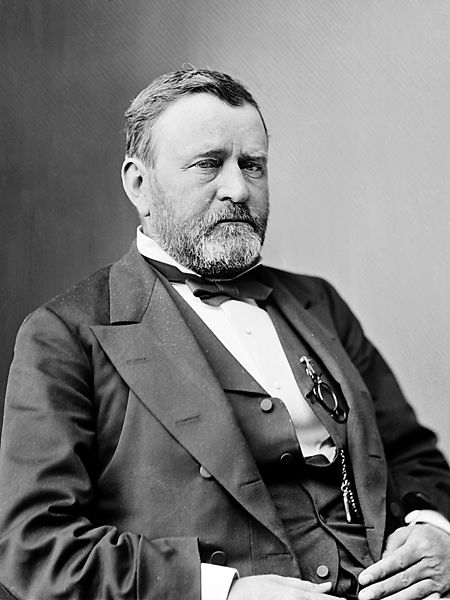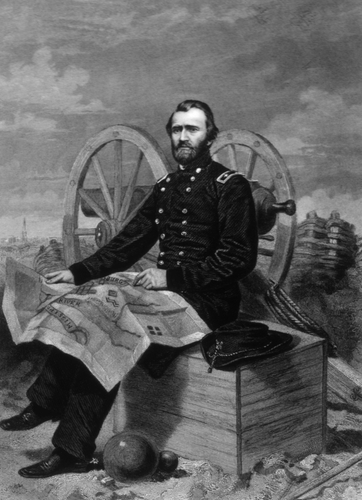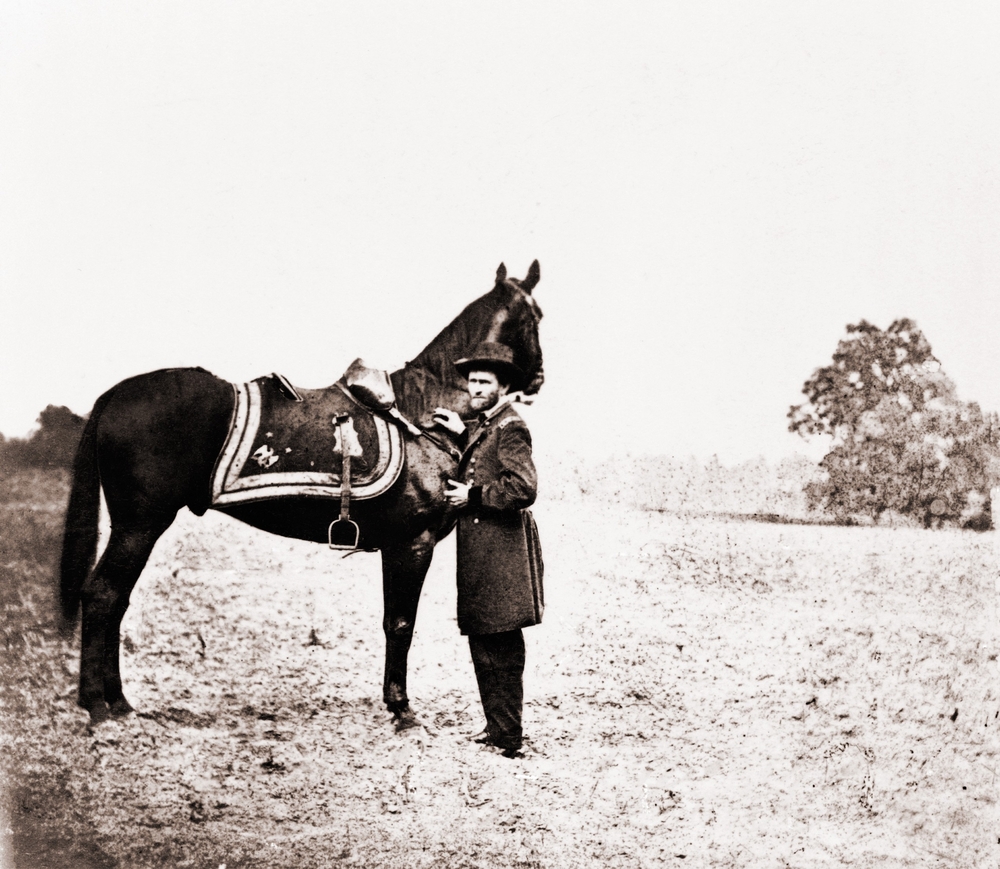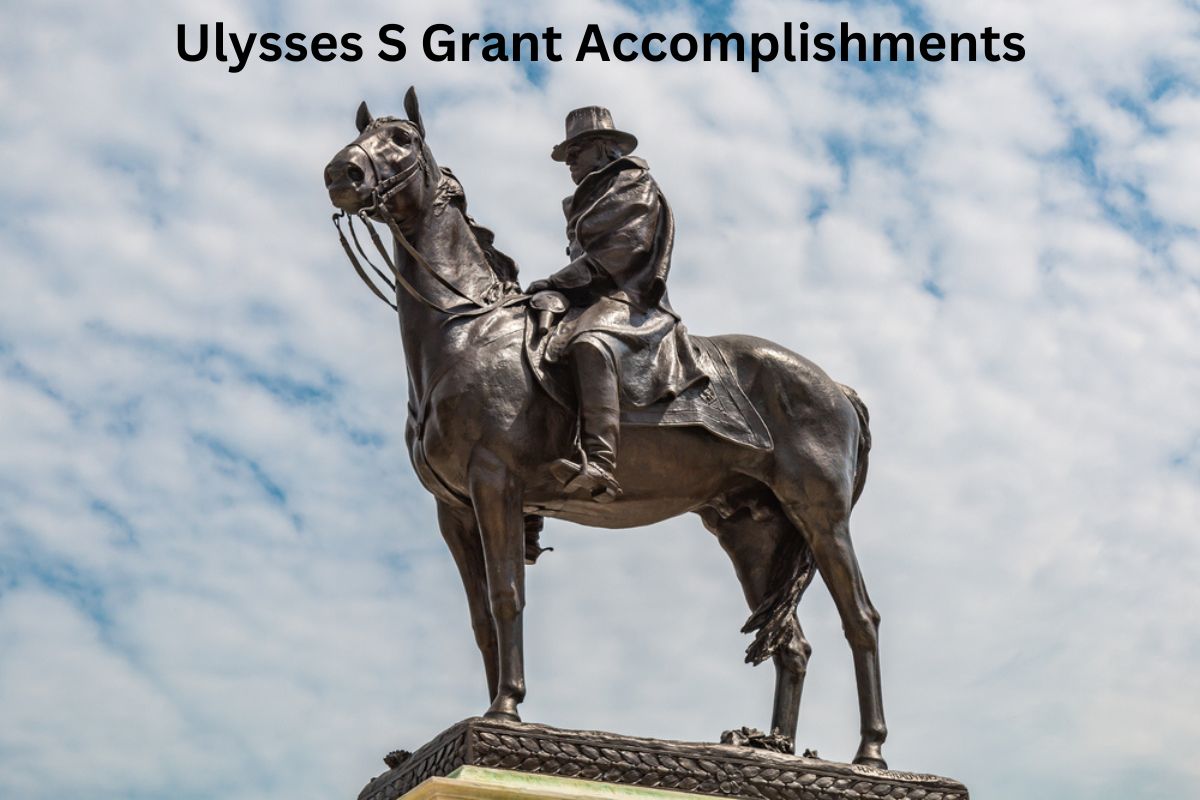Ulysses S. Grant achieved many accomplishments throughout his diverse career, which encompassed military leadership, presidential service, and literary achievements. As a graduate of West Point, he demonstrated bravery and leadership skills during the Mexican-American War.
Grant’s military expertise led to his appointment as the Commanding General of the Union Army during the Civil War, where he secured significant victories and orchestrated the surrender of General Robert E. Lee.
He later served as the 18th President of the United States, advocating for civil rights and enforcing constitutional amendments protecting freed slaves.
Grant’s literary success came in the form of his memoirs, which not only provided financial security for his family but also became celebrated works in American literature. Throughout his career, Grant left an enduring impact on American history.
Accomplishments of Ulysses S Grant
1. Led the Union Army to victory in the American Civil War
Ulysses S. Grant’s leadership as the commanding general of the Union Army played a pivotal role in the Union’s victory during the American Civil War (1861-1865).

Grant’s military expertise and strategic brilliance became evident during his successful campaigns, such as the capture of Fort Donelson, the Battle of Shiloh, and the Siege of Vicksburg. His determination and willingness to engage the Confederate forces head-on earned him the nickname “Unconditional Surrender” Grant.
Also Read: Facts About Ulysses S Grant
Under his leadership, the Union Army employed a comprehensive strategy that ultimately overwhelmed the Confederacy and secured victory for the Union.
2. Negotiated the surrender of General Robert E. Lee, effectively ending the Civil War
One of Grant’s most significant accomplishments was his role in negotiating the surrender of General Robert E. Lee and the Confederate Army of Northern Virginia at Appomattox Courthouse on April 9, 1865.
Grant’s respectful and generous terms of surrender demonstrated his commitment to the principles of unity and reconciliation. The surrender marked the symbolic end of the Civil War and set the stage for the nation’s healing and reconstruction.
3. Served as the 18th President of the United States
Following the Civil War, Ulysses S. Grant was elected as the 18th President of the United States and served two terms from 1869 to 1877. As President, Grant pursued a progressive agenda focused on protecting civil rights, promoting economic growth, and combating corruption.
He advocated for the ratification and enforcement of the 15th Amendment, which granted voting rights to African American men.
Also Read: Ulysses S Grant Timeline
Grant also supported the passage of the Enforcement Acts to combat voter suppression and protect the civil rights of freed slaves in the South.
Additionally, his administration implemented policies aimed at rebuilding the war-torn South, expanding public education, and modernizing the economy through infrastructure development and the enforcement of antitrust laws.
Grant’s presidency laid the groundwork for important social and political reforms during the Reconstruction era.

4. Fought for civil rights and enforced constitutional amendments to protect the rights of freed slaves
Ulysses S. Grant was a staunch advocate for civil rights and equality for all citizens. As President, he worked to enforce the 13th, 14th, and 15th Amendments to the U.S. Constitution, collectively known as the Reconstruction Amendments.
The 13th Amendment abolished slavery, the 14th Amendment granted citizenship and equal protection under the law to all individuals born or naturalized in the United States, and the 15th Amendment guaranteed voting rights regardless of race or color.
Grant actively supported legislation and legal actions to protect these rights and combat racial discrimination.
5. Implemented policies to combat corruption and fraud in government
Grant recognized the need to tackle corruption and fraud in government during his presidency. He took several measures to address these issues, including supporting the passage of the Civil Service Act of 1871, which established the United States Civil Service Commission.
This commission was tasked with ensuring merit-based appointments and reducing political patronage in the federal government. Grant also fought against the notorious “Whiskey Ring” corruption scandal, leading to the prosecution and conviction of several government officials involved in tax evasion schemes.
His efforts laid the foundation for future reforms aimed at promoting transparency and integrity in the federal government.
6. Supported the expansion of public education and advocated for equal rights for all citizens
Grant recognized the importance of education in promoting equal opportunities for all citizens. During his presidency, he advocated for the expansion of public education and supported legislation to provide funding for public schools.
Grant believed that education was essential for both personal and societal progress, and he actively worked to improve access to quality education.
His support for equal rights extended beyond education, as he advocated for the enforcement of civil rights legislation and the protection of voting rights for African Americans and other marginalized communities.
Grant’s commitment to equal rights helped shape the foundation for a more inclusive society.

7. Signed the Yellowstone National Park Protection Act, establishing the world’s first national park
Ulysses S. Grant made a significant contribution to environmental conservation by signing the Yellowstone National Park Protection Act into law on March 1, 1872. This act established Yellowstone National Park as the world’s first national park.
Grant recognized the unique natural beauty and geological wonders of the Yellowstone region and sought to preserve it for future generations.
By designating Yellowstone as a national park, he set a precedent for the conservation and protection of natural landscapes and inspired the creation of many more national parks around the world.
8. Promoted the enforcement of voting rights for African Americans in the South
Grant was dedicated to ensuring the voting rights of African Americans, particularly in the Southern states where voter suppression and intimidation were prevalent after the Civil War.
He advocated for the passage and enforcement of laws such as the Enforcement Acts, which aimed to protect the civil rights of African Americans and combat voter suppression tactics. Grant sent federal troops to oversee elections and protect African American voters, working to secure their rights and promote political participation.
His efforts helped to advance racial equality and expand democratic representation during the challenging period of Reconstruction.
9. Advocated for the enforcement of Native American treaty rights and the establishment of reservations
Grant recognized the injustices suffered by Native American tribes and sought to improve their treatment. He appointed individuals sympathetic to Native American interests to key positions in his administration and supported policies that aimed to protect Native American treaty rights.
Grant advocated for the establishment of reservations where tribes could retain their cultural heritage and govern their internal affairs.
He believed that establishing reservations would provide stability and protect Native American communities from encroachment by settlers and speculators.
Grant’s efforts represented a shift towards a more respectful approach to Native American relations and laid the groundwork for future policies aimed at recognizing tribal sovereignty.
10. Published his memoirs, which became a critical and commercial success, providing financial security for his family after his death
Ulysses S. Grant’s memoirs, written while he was battling terminal throat cancer, became a literary triumph. Published by Mark Twain in 1885, Grant’s Personal Memoirs of Ulysses S. Grant not only received widespread acclaim for their literary merit but also became a bestseller.
The memoirs provided an intimate and detailed account of Grant’s military campaigns and his perspective on the Civil War. Their success ensured financial security for his family after his death and solidified his place as one of America’s great military leaders.
Additionally, Grant’s memoirs are considered one of the finest works of autobiography in American literature and offer valuable insights into the era in which he lived.
